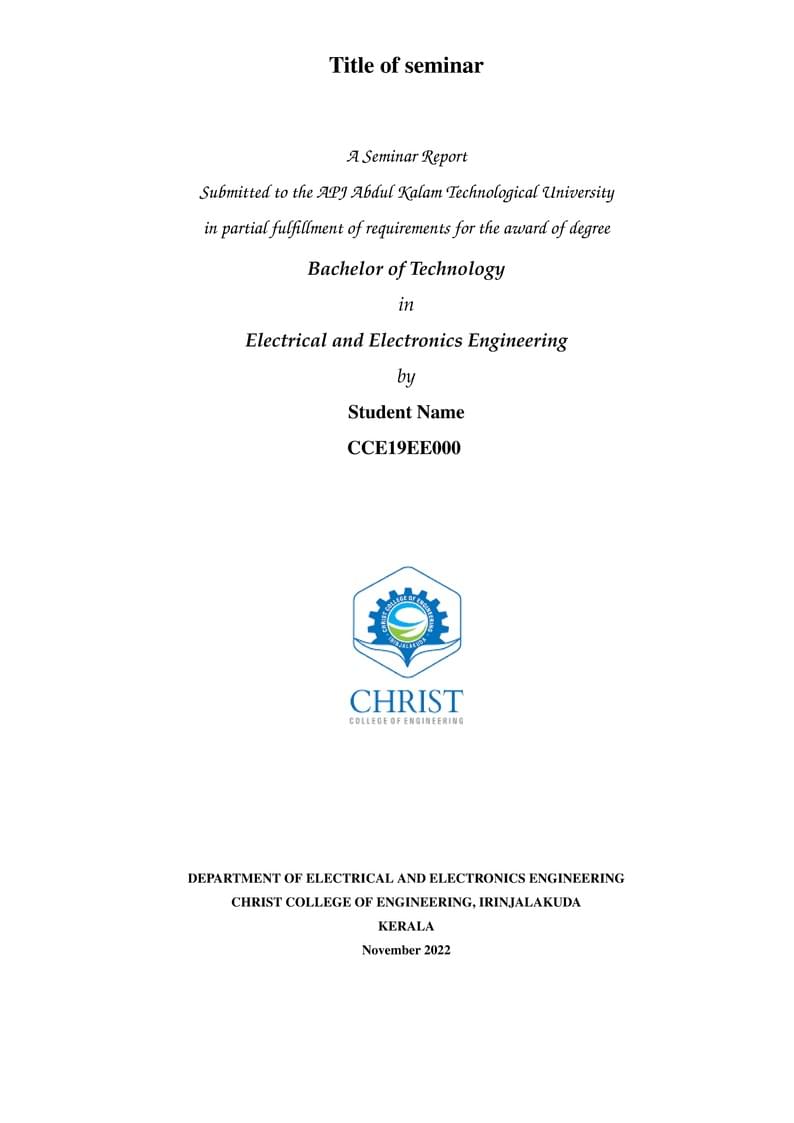
KTU BTech Seminar Report CCE
Author:
Vishnu P Madhanmohan
Last Updated:
3 года назад
License:
Other (as stated in the work)
Аннотация:
KTU seminar Report

\begin
Discover why over 25 million people worldwide trust Overleaf with their work.

\begin
Discover why over 25 million people worldwide trust Overleaf with their work.
\documentclass[12pt,a4paper]{report}
\usepackage{graphicx}
\usepackage{amsmath}
\usepackage{fancyhdr}
\usepackage{cite}
\usepackage{framed}
\usepackage{a4wide}
\usepackage{float}
\usepackage{epsfig}
\usepackage{longtable}
\usepackage{enumerate}
\usepackage{afterpage}
\usepackage{multirow}
\usepackage{ragged2e}
\usepackage{gensymb}
\usepackage{amsfonts}
\usepackage[left=3.5cm,top=1.5cm,right=3cm,bottom=4cm]{geometry}
\usepackage{setspace}
\usepackage{float}
\usepackage{txfonts}
\usepackage{lipsum}
\newcommand{\Usefont}[1]{\fontfamily{#1}\selectfont}
\usepackage{lscape} % for landscape tables
\renewcommand{\baselinestretch}{1.7}
\usepackage{blindtext}
\usepackage{xpatch}
\usepackage{url}
\usepackage{leqno}
\usepackage{subcaption}
\linespread{1.5}
\usepackage[intoc, english]{nomencl}
\hyphenpenalty=5000
\tolerance=1000
\usepackage[nottoc]{tocbibind}
\bibliographystyle{IEEEtran}
\renewcommand{\bibname}{References}
%*******************************************************************
% Header and Footer
% This is not required in Technical reports submitted to CET ECE department.
% Please leave it commented
%*******************************************************************
%\pagestyle{fancy}
%\fancyhead{}
%\header and footer section
%\renewcommand\headrulewidth{0.1pt}
%\fancyhead[L]{\footnotesize \leftmark}
%\fancyhead[R]{\footnotesize \thepage}
%\renewcommand\headrulewidth{0pt}
%\fancyfoot[R]{\small College of Engineering Trivandrum}
%\renewcommand\footrulewidth{0.1pt}
%\fancyfoot[C]{2020 - 2021}
%\fancyfoot[L]{\small Title of the Seminar/Project}
%*******************************************************************
%*********************Figures*****************************
% Save all figures in the folder figures and include them in your
% report using the command \includegraphics{figure-name}
\graphicspath{{figures/}}
% figure files can be in jpeg,jpg, png or pdf formats
%*******************************************************************
\begin{document}
%****The entries in this section are to be filled in by the student with appropriate values *************
% These values are used thoroughout the report
% please fill in the appropriate values
\gdef \title{Title of seminar} % Seminar title
\gdef \author{Student Name} %student name
\gdef \dept{Electrical and Electronics Engineering } %Department
\gdef \degree{Bachelor of Technology} %degree
\gdef \branch{Electrical and Electronics Engineering} %branch
\gdef \college{Christ College of Engineering}
\gdef \collegeplace{Irinjalakuda}
\gdef \rollno{CCE19EE000} %KTU Reg No
\gdef \deptabbr{Dept.of EEE} %Dept name abbreviation
\gdef \guide{Name of guide} %Seminar guide
\gdef \guidedes{Assistant Professor}%Seminar guide designation
\gdef \semcordinatorA{Ms. Emilin Thomas Kangappadan}% Seminar coordinator 1
\gdef \semcordinatorAdes{Assistant Professor}% Seminar coordinator 1 designation
\gdef \semcordinatorB{Mr. Febin Raju} % Seminar coordinator 2
\gdef \semcordinatorBdes{Assistant Professor}% Seminar coordinator 2 designation
\gdef \hod{Dr. M Nandakumar} %Head of Department
\gdef \hoddes{Professor and Head} %HOD designation
\gdef \acadyear{2022 - 23} % Academic year
\gdef \month{November 2022} %Month of Report submission
\gdef \date{DD-MM-YYYY} %Date of signing the declaration
%*******************************************************************
% The font pages. The source tex files are there in the folder
\include{coverpage} %Unless essential Do not edit this tex file
%%********************Certificate*******************
% To print name of only the seminar coordinator 1 in the certificate page
\include{certificate1}
% To print names of both the seminar coordinators in the certificate page
%\include{certificate2} %Please uncomment this and comment the previous line
%%***************************************************
\include{declaration} %Unless essential Do not edit this tex file
\pagenumbering{roman}
%%********************************Abstract***********************
\include{abstract} % Please type in the abstract in this tex file abstract.tex
%%***************************************************
% Default Acknowledgement page
\include{acknowledgement} %Unless essential Do not edit this tex file
%%***************************************************
%%**If you have only one seminar coordinator faculty member
% please comment the above line and uncomment this line
%\include{acknowledgement1} %Unless essential Do not edit this tex file
%*******************************************************************
\thispagestyle{empty}
\newpage
%%**********************Table of Contents***********************
\tableofcontents
\listoffigures
\listoftables
\include{symbol} %List of Symbols (Optional) comment if not required.
% symbold may be added in the file symbol.tex
%%********************Body of the report**********
% Arabic numbering is used in the body of the report
\cleardoublepage
\setcounter{page}{1}
\pagenumbering{arabic}
%%********************Chapter 1**********
\chapter{Introduction}
\lipsum[1] % Please comment this line and type in the introduction chapter
%%********************Chapter 2**********
\chapter{Literature Review}
Technical writing is writing or drafting technical communication used in technical and occupational fields\cite{india}, such as computer hardware and software\cite{rpi}, engineering, chemistry, aeronautics, robotics, finance\cite{japan}, medical, consumer electronics, biotechnology, and forestry. Technical writing encompasses the largest sub-field in technical communication. See figure \ref{net2} that shows the autonomous systems in Internet.
\begin{figure}[h!]
\centering
\includegraphics[width=0.9\linewidth]{ospf}
\caption{Autonomous System Hierarchy}
\label{net2}
\end{figure}
\section{section1}
\lipsum[2] % Please comment this line and type in the introduction chapter
\subsection{title 2}
\lipsum[3] % Please comment this line and type in the introduction chapter
\noindent The system is described by the equation \ref{sys_eq1} below. Here y is the ordinate and x is the abscissa , m is the slope and c a constant.
\begin{equation} \label{sys_eq1}
y = mx + c
\end{equation}
\noindent Page centered and unnumbered multiple equations. The * symbol supresses equation numbering.
% Page centered and unnumbered equations
\begin{align*}
2x - 5y &= 8 \\
3x + 9y &= -12
\end{align*}
\noindent Side by side figures can be created using this environment. See fig \ref{wave} below.
\begin{figure}[h!]
\centering
\begin{subfigure}[b]{0.4\textwidth}
\includegraphics[width=\textwidth]{sinewave}
\caption{Sine Wave}
\label{fig:1}
\end{subfigure}
\hspace{20mm}
\begin{subfigure}[b]{0.4\textwidth}
\includegraphics[width=\linewidth]{cosine}
\caption{Cosine Wave}
\label{fig:2}
\end{subfigure}
\caption{The Sine and Cosine waves}
\label{wave}
\end{figure}
%%********************Chapter 3**********
\chapter{Results}
\lipsum[5-7] % Please comment this line and type in the results chapter
\begin{table}[h!]
\centering
\caption{test table}
\vspace*{5pt}
\begin{tabular}{|c|c|c|}
\hline
Sl. No & Item 1 & Itm 2 \\ \hline
1 & 37 & 45 \\ \hline
2 & 42 & 23 \\ \hline
3 & 47 & 1 \\ \hline
4 & 52 & -21 \\ \hline
5 & 57 & -43 \\ \hline
6 & 62 & -65 \\ \hline
7 & 67 & -87 \\ \hline
8 & 72 & -109 \\ \hline
9 & 77 & -131 \\ \hline
10 & 82 & -153 \\ \hline
\end{tabular}
\end{table}
%%********************Chapter 4**********
\chapter{Conclusion}
\lipsum[2]
%%********************References**********
%%****This template uses IEEE bibliography style
\begin{thebibliography}{99}
\bibitem{india} HU, Yun Chao, et al., \emph{Mobile edge computing?A key technology
towards 5G}, ETSI white paper, 2015, vol. 11, no 11, p. 1-16.
\bibitem{rpi}
@online{ Raspberry pi,
\url{https://www.raspberrypi.org/}
Online; accessed 10-June-2019
}
\bibitem{japan} HU, Yun Chao, et al., \emph{Mobile edge computing?A key technology
towards 5G}, ETSI white paper, 2015, vol. 11, no 11, p. 1-16.
\end{thebibliography}
\end{document}